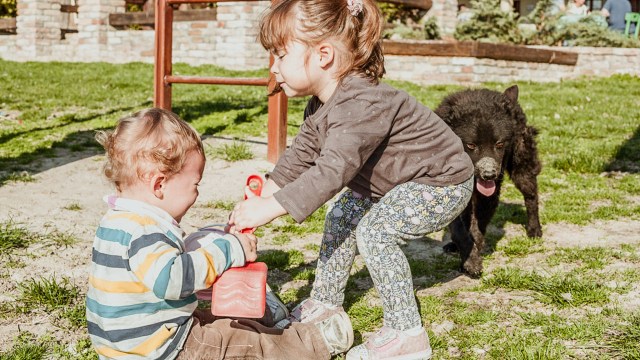So you have a hitter. This can be an especially frustrating situation for a parent as the usual response of ignoring the behavior doesn’t seem to work. Plus, when you ignore a kid who is hitting you, you are, by default, saying that hitting is allowed. It’s a confusing message to send to a little kid, and it’s no shock that it doesn’t lead to the outcome you want. In contrast, coming in hot with, “NO! We do NOT hit!” also has very little chance of working. “For a toddler brain, a big reaction can actually feel fun and exciting, and it gives them that attention that they so desperately crave from us,” shares parenting coach @biglittlefeelings. “And two, it can make your already emotionally volatile kid more volatile in that moment.”
So, how do you stop a toddler from hitting?
Licensed child therapist Deena Margolin, one half of the duo behind @biglittlefeelings, shares two things parents can do to combat hitting behavior:
- Okay their feelings: “Come in calm and confident. Your kid’s volatility is not shaking you,” she explains. Then you’d say something like, “It’s okay to feel mad.” You want them to understand that it’s okay for them to feel what they are feeling.
- Set the boundary: The second step is establishing the boundary: “It’s not okay to hit.” This is firm and unequivocal.
It’s important to close the loop on this lesson when your child is feeling calm and more receptive to new information. You should bring up this incident at a later time and go over what your child was feeling before they lashed out with hitting. Help them recognize those signs before they get to the boiling point. You’d also want to offer alternatives to hitting, like taking deep breaths, using “angry chalk” to color on a chalkboard, or punching a pillow.
A bonus tip: “Remember how toddlers want our attention more than ANYTHING? We can leverage that by doing what we call ‘Spotlight the Right.’ So when your toddler is playing gently or they use coping skills instead of hitting, make a BIG deal to see more of that behavior: ‘Yay! You took some deep tiger breaths instead of hitting!'” Ultimately, “the goal is progress, not perfection,” she reminds us.
